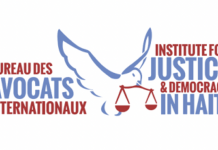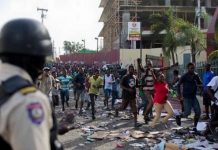Just last week, Ban Ki-moon announced that the U.N. would be starting a new initiative to secure funds for a 10-year, $2.2 billion plan, set to be formally announced in January, that aims to provide Haiti and the Dominican Republic with the clean water and sanitation infrastructure needed to eradicate the disease. Yet despite the U.N.’s pledge to support this plan, the U.N. has failed to ever accept responsibility for the epidemic. Despite a legal complaint filed with the U.N. on behalf of over 5,000 victims of cholera by the Institute for Justice and Democracy in Haiti and Bureau des Avocats Internationaux, U.N. officials continue to avoid their own role in its introduction.
Writing in Foreign Policy on the U.N. announcement last week, Jonathan Katz and Tom Murphy note:
One of the primary means by which the U.N. has deflected blame since the beginning has been to insist that efforts to find the source of the epidemic would detract from fighting it. By relaunching an existing Haitian-Dominican effort under the guise of a U.N. initiative, the world body can once again claim to be too busy saving Haitian lives to comment on how those lives were put in danger in the first place. It took no time for this to happen. When an AP reporter asked on Dec. 11 whether humanitarian coordinator Nigel Fisher thought the U.N. caused the cholera epidemic, he refused to comment, saying: “My focus is on today.”
It is also notable that the prize is named for Ricardo Ortega. Ortega was shot and killed in Haiti in 2004 after the U.S.-backed coup against democratically elected president Jean-Bertrand Aristide. While it was originally reported that Aristide supporters killed Ortega, Ortega’s colleagues – on further investigation – concluded that he may have been killed by U.S. marines who were sent to Haiti following the coup. The marines would later be replaced by MINUSTAH troops. As Democracy Now reported in 2004:
On March 7th of this year, as the coup against Haitian President Jean Bertrand Aristide took shape, journalist Ricardo Ortega fell to the ground as he covered street protests in Port Au Prince. He had been fatally shot in the chest. His last words, as he was loaded onto a truck with other wounded, were “I cannot breathe.” It was reported at the time that he had been shot by Aristide supporters.
Ricardo was in Haiti as a freelance journalist, after being dismissed as New York correspondent for the Spanish TV station Antena 3, which had ties to the former government of Jose Maria Aznar. The reporter told friends that he was dismissed after the government complained to his superiors that his reports of the Bush administration were too critical.
Months after the death of Ricardo Ortega, his friend and colleague Jesús Martin traveled to Haiti with a crew to film a program paying tribute to his friend. But as they began to interview the witnesses to Ricardo’s killing, they were shocked to learn that he was probably killed by American marines, and not by supporters of Aristide, as had been claimed officially. Witness after witness described the arrival of a contingent of Marines on the scene, and the subsequent gunfire that came from their direction and struck the reporter. The witnesses complained that no-one had ever contacted them to find out what happened, and that no investigation had ever been conducted into the killing of Ricardo Ortega.
An official Haitian government investigation also concluded that Ortega had been killed by the “foreign interposition force present in Haiti” at the time, rather than Aristide supporters. Reporters Without Borders had blamed Aristide supporters for Ortega’s death, saying that “an outburst by Aristide supporters caused the death of Ricardo Ortega,” and stating in a July 2004 report [PDF]:
Ortega’s death reminded the media that Aristide supporters would remain a threat to it as long as they were armed. Initial inves-tigation showed that the ambush in which Ortega and the other seven were killed had been carefully prepared.
The conclusions of the judge, Bernard Saint-Vil, invalidate the theory, which has long been circulated, that the bullets which fatally wounded Ricardo Ortega came from the supporters of Jean-Bertrand Aristide, during demonstrations after he was ousted from power.





